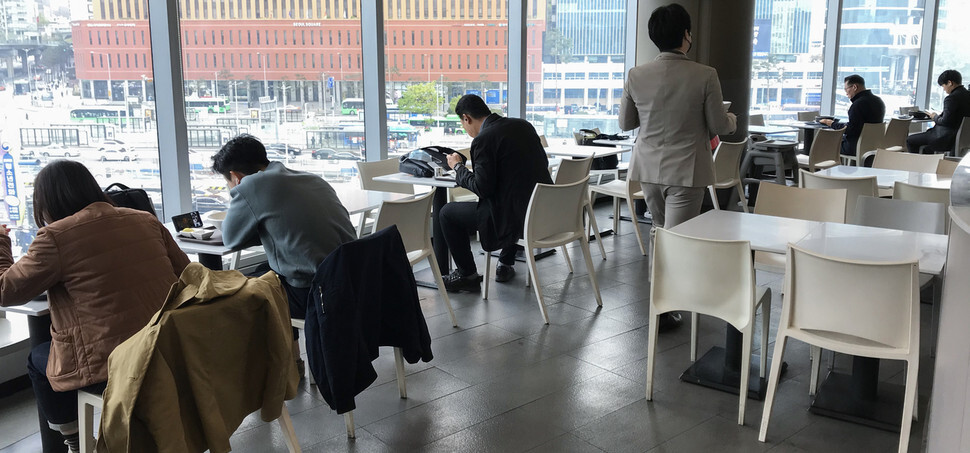hankyoreh
Links to other country sites 다른 나라 사이트 링크
[Reportage] S. Koreans returning to offices after weeks of social distancing and working from home

After the South Korean government eased its social distancing regulations, company employees who’d been working from home are heading back to their offices. But their workplaces are completely different than they were four weeks ago. Offices offer a stark look at changing customs in the “post-corona world” — no meetings, less overtime, and minimal chit-chat.
Every morning at 9 am, social distancing guidelines are announced over the intercom of the cosmetics company in Seoul where Jeon, 31, works. By now, he’s grown familiar with the instructions to avoid meetings and keep physical distance from other people, but he still finds herself adjusting his face mask whenever he hears them.
Most people in Jeon’s office wear masks while they work; you can’t even get on the company’s elevator without one. The office cafeteria serves departments in rotation, and employees have to sit in a row, without anyone facing them on the other side of the table. The result is a lonesome silence that motivates some employees to skip out on the cafeteria and eat at nearby restaurants.
Han, an employee at a major IT firm, transitioned to coming into the office two days a week on Apr. 19. Prior to that, he’d been working entirely from home. Since employees are on a rotation for in-office work, the number of staff on hand has been reduced by half, leaving the office rather quiet. In the past, Han had often been expected to stay late at the office — but not anymore. “I hope this kind of work environment sticks around in the post-corona era,” he said.
Routine distancing at the office depends upon minimizing face-to-face encounters. Since Apr. 19, video game publisher Nexon has instituted a number of measures toward that end: three in-office days each week, only one person per two seats in shuttle buses, and more parking space for people who drive to work. Not only huge conglomerates like LG and Samsung but SMEs and local government offices have set up clear dividers at cafeteria tables. Inha University Hospital is one organization that’s implementing a range of measures, including conducting job interviews over video calls.
Office culture is undergoing a rapid change as well. The regular company dinners that have long been typical of Korean companies are moving online, with people connected by their computer monitors. Sometimes, employees are even allowed to eat at home on their company’s dime with no video meetings.
Kim, 31, said her department hasn’t had a company dinner in two months. “Now that we aren’t forced to attend company gatherings, I have more free time in the evenings after work. I’ve started forming some hobbies at home, such as doing yoga and listening to music,” she said.
“I hope this is a chance for regular telecommuting to take root,” said Choe, 35, who works for a startup.
Some feel frustrated by lack of social contact and conversationOthers are disappointed by the lack of conversation in the new work culture. “I used to be able to blow off some steam and relax by chatting with my coworkers at lunch time. But since they’ve got these dividers separating us at mealtime, conversation has decreased to the bare minimum,” said Lee, 55, who works at a hypermarket in Seoul’s Nowon District.
“I find the cafeteria so frustrating that I’ve started packing my own lunches,” said Mun, 30, who’s employed by an insurance company.
“The dividers they’ve set up on restaurant tables have made me lose my appetite. One time, I got called out just for taking a phone call while I was eating,” said a self-styled “working mom” on an online message board.
By Bae Ji-hyun and Chai Yoon-tae, staff reporters
Please direct comments or questions to [english@hani.co.kr]

Editorial・opinion
![[Column] Park Geun-hye déjà vu in Yoon Suk-yeol [Column] Park Geun-hye déjà vu in Yoon Suk-yeol](https://flexible.img.hani.co.kr/flexible/normal/500/300/imgdb/original/2024/0424/651713945113788.jpg) [Column] Park Geun-hye déjà vu in Yoon Suk-yeol
[Column] Park Geun-hye déjà vu in Yoon Suk-yeol![[Editorial] New weight of N. Korea’s nuclear threats makes dialogue all the more urgent [Editorial] New weight of N. Korea’s nuclear threats makes dialogue all the more urgent](https://flexible.img.hani.co.kr/flexible/normal/500/300/imgdb/original/2024/0424/7317139454662664.jpg) [Editorial] New weight of N. Korea’s nuclear threats makes dialogue all the more urgent
[Editorial] New weight of N. Korea’s nuclear threats makes dialogue all the more urgent- [Guest essay] The real reason Korea’s new right wants to dub Rhee a founding father
- [Column] ‘Choson’: Is it time we start referring to N. Korea in its own terms?
- [Editorial] Japan’s rewriting of history with Korea has gone too far
- [Column] The president’s questionable capacity for dialogue
- [Column] Are chaebol firms just pizza pies for families to divvy up as they please?
- [Column] Has Korea, too, crossed the Rubicon on China?
- [Correspondent’s column] In Japan’s alliance with US, echoes of its past alliances with UK
- [Editorial] Does Yoon think the Korean public is wrong?
Most viewed articles
- 1‘We must say no’: Seoul defense chief on Korean, USFK involvement in hypothetical Taiwan crisis
- 2N. Korean delegation’s trip to Iran shows how Pyongyang is leveraging ties with Moscow
- 3‘Weddingflation’ breaks the bank for Korean couples-to-be
- 4Korea sees more deaths than births for 52nd consecutive month in February
- 546% of cases of violence against women in Korea perpetrated by intimate partner, study finds
- 6Will NewJeans end up collateral damage in internal feud at K-pop juggernaut Hybe?
- 7[Column] Park Geun-hye déjà vu in Yoon Suk-yeol
- 8[Editorial] New weight of N. Korea’s nuclear threats makes dialogue all the more urgent
- 9Amnesty notes ‘erosion’ of freedom of expression in Korea in annual human rights report
- 10“Parental care contracts” increasingly common in South Korea